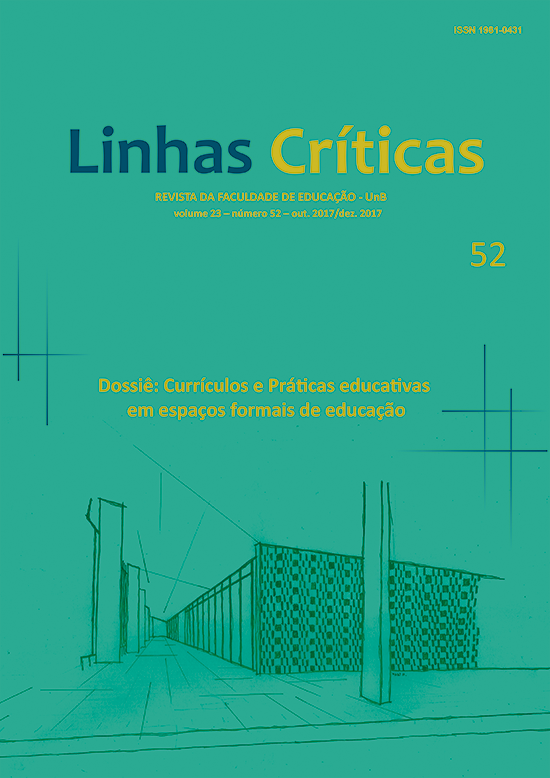Em gênero e sexualidade aprende-se pela repetição com diferença: cenas escolares
DOI:
https://doi.org/10.26512/lc.v23i52.23614Keywords:
Heteronormativity, Norm, Difference, RepetitionAbstract
The article presents scenes that occurred in the school environment in which heteronormativity is propagated not only by the marginalization of non-hegemonic expressions of gender and sexuality, but mainly by the meticulous performance of the norm that induces heterosexuality to be assumed to be true sexuality. There is a subtle set of pedagogies that invites us to repeat the norm, waving with benefits of social insertion. But there are contingencies, inquiries, interpellations, confrontations that make us repeat with differences what the norm prescribes, and this is the space of education, always stressed by the repetition of the norm with differences, fruit of the new contexts and the demands of youth cultures.
Downloads
References
André, Marli Eliza D. A. de. (1995). Etnografia da Prática Escolar. Campinas: Papirus.
Butler, Judith. (2000). Corpos que pesam: sobre os limites discursivos do ‘sexo’. In: Louro, Guacira Lopes (org). O Corpo Educado: pedagogias da sexualidade. 2. ed. Belo Horizonte: Autêntica. p. 151-172.
Butler, Judith. (2002). Problemas de Gênero. Rio de Janeiro: Civilização Brasileira, 2003.
Costa, Marisa Vorraber. Apresentação. In: Butler, Judith. Caminhos Investigativos: novos olhares na pesquisa em educação. Rio de Janeiro: DP&A. p. 9-12.
Deleuze, Gilles. (2000). Diferença e Repetição. Lisboa: Relógio d’Água.
Ewald, François. (2000). Foucault, a Norma e o Direito. Alpiarça (Portugal): Vega.
Fischer, Rosa Maria Bueno. (2003). “Foucault revoluciona a pesquisa em educação?” Perspectiva, Florianópolis, UFSC, v. 21, n. 02, p. 371-389, jul.-dez. Disponível em: <http://www.perspectiva.ufsc.br/perspectiva_2003_02/07_artigo_rosa_maria.pdf >. Acesso em: 31 jan. 2017.
Foucault, Michel. (1999). História da Sexualidade I: a vontade de saber. 13. ed. Rio de Janeiro: Graal.
Foucault, Michel. (2004). Michel Foucault, uma entrevista: sexo, poder e a política da identidade. Verve, São Paulo, PUC-SP, n. 05, p. 260-277. Disponível em:
<http://revistas.pucsp.br/index.php/verve/article/viewFile/4995/3537>. Acesso em: 31 jan. 2017.
Gagnon, John. (2006). Uma Interpretação do Desejo ”“ ensaios sobre o estudo da sexualidade. Rio de Janeiro: Garamond.
Louro, Guacira Lopes. (2000). Pedagogias da sexualidade. In: Louro, Guacira Lopes. O Corpo Educado: pedagogias da sexualidade. 2. ed. Belo Horizonte: Autêntica. p. 9-34.
Louro, Guacira Lopes. (2017). “Teoria queer: uma política pós-identitária para a educação”. Estudos Feministas, Florianópolis, UFSC, v. 9, n. 2, p. 541-553, 2001. Disponível em: <http://www.scielo.br/pdf/ref/v9n2/8639.pdf >. Acesso em: 31 jan. 2017.
Louro, Guacira Lopes. (2009). Heteronormatividade e homofobia. In: Junqueira, Rogério Diniz (Org.). Diversidade Sexual na Educação. Brasília: Ministério da Educação, Secretaria de Educação Continuada, Alfabetização e Diversidade, UNESCO. p. 85-93.
Miskolci, Richard. (2009). A teoria queer e a sociologia: o desafio de uma analítica da normalização”. Sociologias, Porto Alegre, UFRGS, ano 11, n. 21, p. 150-182, jan.-jun. Disponível em: <http://www.scielo.br/pdf/soc/n21/08.pdf >. Acesso em: 31 jan. 2017.
Picchetti, Yara de Paula; Seffner, Fernando. (2016). Cada um com a sua certeza: a escola e os esforços cotidianos para estar na norma e resistir a esta. In.: SILVA, I. Ri. da; NEVES, A. L. M. Das; SILVA, F. P. P. da. (orgs.) Educação e Sexualidade: uma perspectiva crítica. Manaus, Universidade Federal do Amazonas UFAM: UEA
Edições, v.1, p. 79-100.
Rich, Adrienne. (2010). Heterossexualidade compulsória e existência lésbica. Bagoas, Natal, UFRN, n. 5, p. 17-44. Disponível em: <http://www.cchla.ufrn.br/bagoas/v04n05art01_rich.pdf >. Acesso em: 31 jan. 2017.
Rodrigues, Carla. (2012). Performance, gênero, linguagem, alteridade: J.Butler e J.Derrida. Sexualidad, Salud, y Sociedad, Revista Latinoamericana, n. 10, p. 140-164, abr. Disponível em: <http://www.scielo.br/pdf/sess/n10/a07n10.pdf>. Acesso em: 31 jan. 2017.
Rubin, Gayle. (1993). O Tráfico de Mulheres: notas sobre a “economia política” do sexo. Recife: SOS Corpo.
Sedgwick, Eve Kosofsky. (1993). A epistemologia do armário. Cadernos Pagu, Campinas, UNICAMP, v. 28, p. 19-54, jan.-jun. X. Disponível em: <http://www.scielo.br/pdf/cpa/n28/03.pdf >. Acesso em: 31 jan. 2017.
Seffner, Fernando. (2015). Modus vivendi, liberdade religiosa e liberdade sexual: o que a escola tem a ver com isso? In: Nardi, H. C.; Machado, P. S.; Silveira, R. da S. (Orgs.). Diversidade sexual e relações de gênero nas políticas públicas: o que a laicidade tem a ver com isso? Porto Alegre: Editora Deriva/ABRAPSO, p. 81-104.
Seffner, Fernando; Picchetti, Yara de Paula. (2014). A escola pública brasileira e seu compromisso com a diversidade de gênero e sexualidade. In: Magalhães, J. C.; Ribeiro, P. R. C. (Orgs.). Educação para a sexualidade. Rio Grande: Editora da FURG, p. 67-81.
Warner, Michael. (1993). Fear of a queer planet. Minneapolis: University of Minnesota.
Downloads
Published
How to Cite
Issue
Section
License
Copyright (c) 2018 Revista Linhas Críticas

This work is licensed under a Creative Commons Attribution 4.0 International License.
Authors who publish in this journal agree to the following terms:
-Authors maintains the copyright and grants the journal the right of first publication, the work being simultaneously licensed under the Creative Commons Attribution License which allows the sharing of the work with recognition of the authorship of the work and initial publication in this journal.
- Authors are authorized to enter into additional contracts separately, for non-exclusive distribution of the version of the work published in this journal (eg publish in institutional repository or as a book chapter), with acknowledgment of authorship and initial publication in this journal.
-Authorers are allowed and encouraged to publish and distribute their work online (eg in institutional repositories or on their personal page) at any point before or during the editorial process, as this can generate productive changes as well as increase the impact and the citation of published work (See The Effect of Free Access).



